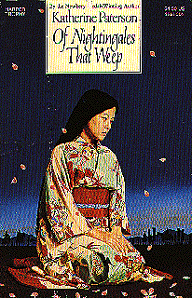|
After the death of her samurai father, a Japanese girl is forced to make a heartbreaking choice between love and honor. |
CONTACT US
|
ADVERTISING INFO
© 1996-2013 Asian Media Group Inc
No part of the contents of this site may be reproduced without prior written permission.
GOLDSEA | ASIAN BOOKVIEW | KIDS' BOOKS
 Of Nightingales That Weep
Of Nightingales That Weep
by Katherine Paterson
HarperCollins, New York, 1974, 170 pp, $4.50 (paperback)
EXCERPT:
 he daughter of a samurai does not scream when her hair is being combed.
Indeed, she makes no sound at all. It was one of the more elementary rules
of conduct that her mother had drummed into her for eleven years.
Nonetheless, when Choko yanked the comb through a particularly stubborn
knot, Takiko's daughter of Lord Moriyuki of the Heike clan, cried out,
"Choko! You're trying to kill me."
he daughter of a samurai does not scream when her hair is being combed.
Indeed, she makes no sound at all. It was one of the more elementary rules
of conduct that her mother had drummed into her for eleven years.
Nonetheless, when Choko yanked the comb through a particularly stubborn
knot, Takiko's daughter of Lord Moriyuki of the Heike clan, cried out,
"Choko! You're trying to kill me."
"Nonsense!" snapped the maid. "Just hold still, and it won't pull so much."
She gave another sound yank. "Where were you yesterday? Your hair looks
as if crows had been nesting in it."
"Aeii! Stop it. I'll tell my aunt on you. You have no respect."
The maid proved unmoved by her threat. "Will you also tell her where you
were hiding when it was time for your koto lesson?" she asked mildly, lifting
a hank of long black hair up to the light as if to show up the tangles. Then
she sank in the comb and jerked it, like a knife, through the heart of the
snarl.
Takiko was nearly pulled off her knees, but this time she bit her lip. She
musn't give Choko the satisfaction of another protest. "Stupid Choko," she
thought. "Servants are all stupid." None of them could understand why she
hid. They probably thought it was because she hated music.
Her concentration shifted from the pain in her scalp to the contemplation of
her secret.
She smiled inwardly. If the rest of the household only knew. She could
remember vividly the day that the truth had occurred to her. The rain was
beating against the wooden shutters. In the dim lamplight, Aunt was
pressing Takiko's small fingers down upon the strings and guiding her right
hand as the plectrums attached to her fingers plucked the strings of the
koto. Suddenly she knew. There was no music inside her aunt, who was
breathing on her neck and singing the Chinese song in a harsh, aged voice.
No. The music was inside her -- Takiko. She was not simply a samurai's
daughter who had to be forced to learn the arts of entertainment befitting
her station; she was a maker of music.
From that day, nearly a year ago, she could hardly bear to take direction
from her aunt, for Lady Uchinaka's playing was square and precise, like the
earnest brushstrokes of a rather clever beginner, while the music within
Takiko danced like the sweeping calligraphy of a master artist. She knew
this. But she could not explain it to anyone, because the music within her
head had not yet reached her fingertips. If she tried to talk about it, she
might be scolded for her arrogance, or worse yet, she might be laughed at.
